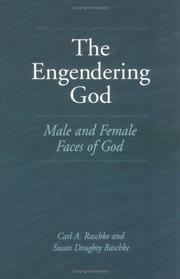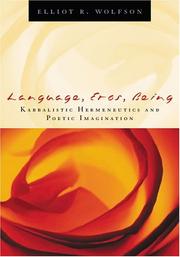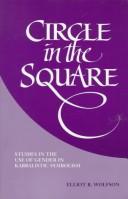| Listing 1 - 8 of 8 |
Sort by
|
Book
ISBN: 9780802879097 0802879098 Year: 2022 Publisher: Grand Rapids, Michigan William B. Eerdmans
Abstract | Keywords | Export | Availability | Bookmark
 Loading...
Loading...Choose an application
- Reference Manager
- EndNote
- RefWorks (Direct export to RefWorks)
A robust theological argument against the assumption that God is male. God values women. While many Christians would readily affirm this truth, the widely held assumption that the Bible depicts a male God persists—as it has for centuries. This misperception of Christianity not only perniciously implies that men deserve an elevated place over women but also compromises the glory of God by making God appear to be part of creation, subject to it and its categories, rather than in transcendence of it. Through a deep reading of the incarnation narratives of the New Testament and other relevant scriptural texts, Amy Peeler shows how the Bible depicts a God beyond gender and a savior who, while embodied as a man, is the unification in one person of the image of God that resides in both male and female. Peeler begins with a study of Mary and her response to the annunciation, through which it becomes clear that God empowers women and honors their agency. Then Peeler describes from a theological standpoint how the virgin birth of Jesus—the second Adam—reverses the gendered division enacted in the garden of Eden. While acknowledging the significance of the Bible’s frequent use of “Father” language to represent God as a caring parent, Peeler goes beneath the surface of this metaphor to show how God is never sexualized by biblical writers or described as being physically involved in procreation—making the concept of a masculine God dubious, at best. From these doctrinal centers of Christianity, Peeler leads the way in reasserting the value of women in the church and prophetically speaking out against the destructive idolatry of masculinity.
Masculinity of God --- Women --- Femininity of God --- Biblical teaching
Book
ISBN: 3170099477 Year: 1988 Publisher: Stuttgart Kohlhammer
Abstract | Keywords | Export | Availability | Bookmark
 Loading...
Loading...Choose an application
- Reference Manager
- EndNote
- RefWorks (Direct export to RefWorks)
Bible and feminism --- God --- Masculinity of God --- Patriarchy --- Biblical teaching --- Bible. --- Feminist criticism. --- Theology.

ISBN: 0664255027 Year: 1995 Publisher: Louisville Westminster John Knox
Abstract | Keywords | Export | Availability | Bookmark
 Loading...
Loading...Choose an application
- Reference Manager
- EndNote
- RefWorks (Direct export to RefWorks)
Femininity of God --- Masculinity of God --- Biblical teaching --- History of doctrines

ISBN: 082322418X 0823224198 0823224201 0823235378 0823237850 082324735X 1282698648 9786612698644 Year: 2005 Publisher: New York Fordham University Press
Abstract | Keywords | Export | Availability | Bookmark
 Loading...
Loading...Choose an application
- Reference Manager
- EndNote
- RefWorks (Direct export to RefWorks)
Cabala --- Femininity of God --- Hermeneutics --- Imagination --- Masculinity of God --- Poetics --- History --- Religious aspects --- Judaism

ISBN: 0585059780 9780585059785 9780791424056 0791424057 9780791424063 0791424065 9781438424378 143842437X 0791424057 0791424065 Year: 1995 Publisher: Albany
Abstract | Keywords | Export | Availability | Bookmark
 Loading...
Loading...Choose an application
- Reference Manager
- EndNote
- RefWorks (Direct export to RefWorks)
This book deals with aspects of the gender imaging of God in a variety of medieval kabbalistic sources. It provides the key to understanding the phenomenological structures of mystical experience as well as the thematic correlation of esotericism and eroticism that is central to the kabbalah. The author examines the role of gender utilizing current feminist studies and cultural anthropology. He explores the themes of the feminization of the Torah, the correlation of circumcision and vision of God, the phallocentric understanding of divine creation as a process of inscription mythologized as an act of sexual self-gratification, and the phenomenon of gender-crossing in kabbalistic myth and ritual. Collectively, the studies explore in great depth the androcentric phallocentrism that is characteristic of medieval Jewish mysticism.
Cabala --- God (Judaism) --- Masculinity of God --- Femininity of God. --- Kabbale --- Dieu (Judaïsme) --- Dieu --- History --- Histoire --- Masculinité --- Féminité --- Zohar. --- ZOHAR --- GOD (JUDAISM) --- FEMININITY OF GOD --- CABALA --- RELIGION --- Zohar --- Femininity Of God --- Religion --- God (judaism) --- Femininity of god
Book
ISBN: 9780525520450 Year: 2022 Publisher: New York (N.Y.) : Knopf,
Abstract | Keywords | Export | Availability | Bookmark
 Loading...
Loading...Choose an application
- Reference Manager
- EndNote
- RefWorks (Direct export to RefWorks)
"An astonishing and revelatory history that re-presents God as he was originally envisioned by ancient worshippers--with a distinctly male body, and with superhuman powers, earthly passions, and a penchant for the fantastic and monstrous. The scholarship of theology and religion teaches us that the God of the Bible was without a body, only revealing himself in the Old Testament in words mysteriously uttered through his prophets, and in the New Testament in the body of Christ. The portrayal of God as corporeal and masculine is seen as merely metaphorical, figurative, or poetic. But, in this revelatory study, Francesca Stavrakopoulou presents a vividly corporeal image of God: a human-shaped deity who walks and talks and weeps and laughs, who eats, sleeps, feels, and breathes, and who is undeniably male. Here is a portrait--arrived at through the author's close examination of and research into the Bible--of a god in ancient myths and rituals who was a product of a particular society, at a particular time, made in the image of the people who lived then, shaped by their own circumstances and experience of the world. From head to toe--and every part of the body in between--this is a god of stunning surprise and complexity, one we have never encountered before"--
Dieu --- God --- God. --- Image de Dieu --- Image of God --- Image of God. --- Masculinity of God --- RELIGION / Biblical Studies / History & Culture. --- RELIGION / Christian Church / History. --- RELIGION / Christian Theology / History. --- Corporéité --- Histoire des doctrines. --- Masculinité --- Corporeality --- History of doctrines.
Book
ISBN: 9783161522628 3161522621 Year: 2012 Volume: 336 Publisher: Tübingen Mohr Siebeck
Abstract | Keywords | Export | Availability | Bookmark
 Loading...
Loading...Choose an application
- Reference Manager
- EndNote
- RefWorks (Direct export to RefWorks)
Doctrine of God (christianism) --- Bible NT. Gospels. John --- God --- Fatherhood --- Bible --- Criticism, interpretation, etc --- 226.5 --- Evangelie volgens Johannes --- Fatherhood of God --- Children of God --- Masculinity of God --- Bible. --- Jean (Book of the New Testament) --- Johanisi (Book of the New Testament) --- Johannesevangelium --- John (Book of the New Testament) --- Yohan pogŭm --- Yohane den (Book of the New Testament) --- Yūḥannā (Book of the New Testament) --- Criticism, interpretation, etc. --- Ioganaĭ (Book of the New Testament) --- Иоганай (Book of the New Testament) --- God - Fatherhood
Book
ISBN: 3451289504 9783451289507 Year: 2006 Publisher: Freiburg Herder
Abstract | Keywords | Export | Availability | Bookmark
 Loading...
Loading...Choose an application
- Reference Manager
- EndNote
- RefWorks (Direct export to RefWorks)
Doctrine of God (christianism) --- Bible NT. Gospels. John --- God --- 226.5 --- Fatherhood of God --- Children of God --- Masculinity of God --- Fatherhood --- Evangelie volgens Johannes --- Bible. --- Jean (Book of the New Testament) --- Johanisi (Book of the New Testament) --- Johannesevangelium --- John (Book of the New Testament) --- Yohan pogŭm --- Yohane den (Book of the New Testament) --- Yūḥannā (Book of the New Testament) --- Criticism, interpretation, etc. --- Ioganaĭ (Book of the New Testament) --- Иоганай (Book of the New Testament)
| Listing 1 - 8 of 8 |
Sort by
|

 Search
Search Feedback
Feedback About UniCat
About UniCat  Help
Help News
News